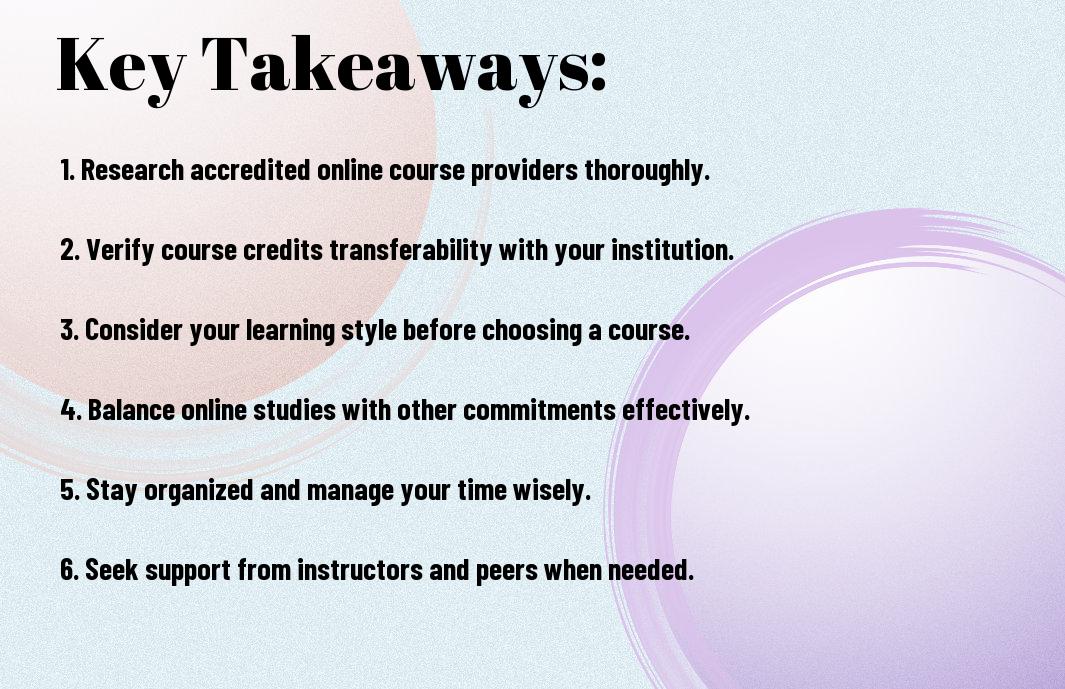You can take control of your education and earn college credit from the comfort of your own home through online courses. Your path to a degree can be accelerated by leveraging online learning platforms that offer credit-eligible courses. You will learn how to navigate the process, from selecting accredited institutions to transferring credits, and get the most out of online learning to achieve your academic goals.
Key Takeaways:
To earn college credit through online courses, consider the following points:
- Take accredited online courses that are recognized by colleges and universities, ensuring the credits are transferable and valid.
- Look for flexible online courses that fit your schedule, allowing you to balance work, life, and studies.
- Choose online courses that align with your degree requirements, ensuring the credits earned will count towards your desired major or program.
- Verify the transfer policies of your desired college or university, understanding which online courses and credits will be accepted.
- Consider cost-effective online courses that offer affordable tuition rates, helping you save money on your overall education expenses, while still earning valuable college credits.
Benefits of Online Courses
A key advantage of online courses is that they offer you a convenient and accessible way to earn college credit, allowing you to balance your academic goals with other responsibilities.
Increased Flexibility
For your benefit, online courses provide a flexible schedule, enabling you to complete coursework at your own pace and on your own time, making it easier to manage your workload and other commitments.
Broader Course Options
By taking online courses, you gain access to a wider range of courses and programs, including those that may not be available at your local college or university, giving you more opportunities to explore your interests and career goals.
A significant advantage of this increased access is that you can now pursue courses that align with your academic and professional aspirations, even if they are not offered in your geographical area, allowing you to create a more tailored and relevant educational experience.

Types of Online Courses
The types of online courses you can take vary, including:
- Credit-bearing courses
- Non-credit courses
Recognizing your goals will help you choose the right type.
Course Type Description Credit-bearing Earn college credit Non-credit No college credit Certification Specialized skills MOOCs Massive open courses Professional Career development Credit-Bearing Courses
By exploring credit-bearing courses, you can earn college credit that can be transferred to your degree program, allowing you to get closer to your goal of graduating.
Non-Credit Courses
By taking non-credit courses, you can gain knowledge and skills in a particular area without earning college credit, which can still be beneficial for your personal and professional development.
Further, non-credit courses can provide you with flexibility and affordability, as they are often less expensive than credit-bearing courses and can be taken at your own pace, allowing you to balance your coursework with your other responsibilities.
Eligibility and Requirements
Now, to earn college credit through online courses, you need to check your eligibility. You can explore Online College Courses for Credit to learn more about the opportunities available to you.
Age and Prerequisites
Along with other requirements, you typically need to meet age and prerequisite criteria to enroll in online courses, which may vary depending on the institution and course you choose.
Technical Requirements
Against the backdrop of increasing online learning, you should ensure your device and internet connection meet the technical requirements for your chosen course.
Even with a reliable internet connection, you will need to ensure your device has the necessary software and hardware to support the online course platform, allowing you to complete your coursework effectively and efficiently, which will help you stay on track to earn your college credit.
Accreditation and Transferability
Unlike traditional college courses, online courses require you to verify their accreditation and transferability to ensure your credits are recognized by your institution. You need to research the accreditation of the online course provider to confirm its legitimacy.
Regional Accreditation
At this stage, you should check if the online course provider has regional accreditation, which is typically accepted by most colleges and universities, allowing you to transfer your credits easily. You can check the accreditation status on the provider’s website or contact your institution for verification.
National Accreditation
By opting for nationally accredited online courses, you can ensure a wider acceptance of your credits across various institutions. You should verify the accreditation status with the relevant accrediting agency to confirm its validity.
Also, national accreditation provides you with more flexibility in transferring your credits to other institutions, as many colleges and universities accept credits from nationally accredited providers. You can check with your institution to confirm their transfer policies and procedures, ensuring a smooth transition of your credits.
Course Formats and Structures
After selecting your online course, you’ll notice various formats and structures. If you’re looking for online college credit courses, check out the discussion on online college credit courses forum to learn more about available options.
Synchronous and Asynchronous Learning
On exploring online courses, you’ll find that they offer synchronous and asynchronous learning options, allowing you to choose the pace that suits your needs, enabling you to manage your time effectively.
Self-Paced Learning
Along with flexibility, self-paced learning provides an opportunity for you to take control of your education, progressing at a speed that suits your learning style and schedule.
At the heart of self-paced learning is the ability to balance your academic goals with other responsibilities, as you can complete coursework on your own schedule, allowing you to work at a pace that is comfortable for you, which can lead to a more effective learning experience and better retention of course material.

Tips for Success
Your path to earning college credit through online courses requires careful planning. Consider the following:
- Set achievable goals
- Choose reputable platforms
The key to success lies in your ability to stay focused and committed to your goals.
Time Management and Discipline
Succeeding in online courses demands effective time management and discipline. You will need to allocate specific times for studying and stick to your schedule to make the most out of your online courses.
Staying Motivated and Engaged
Timing is everything when it comes to online learning. You should create a routine that allows you to engage with course materials regularly and stay motivated throughout the duration of the course.
Consequently, as you progress through your online courses, you will find that staying motivated and engaged becomes easier. You will have the flexibility to learn at your own pace, which can be a great motivator, and you will be able to see the progress you are making towards your goals, which can help you stay engaged and interested in the course material.
Final Words
On the whole, you can efficiently earn college credit through online courses, enhancing your academic and professional prospects. You can explore various options, such as Online Courses for College Credit | Individual Classes, to find the one that suits your needs. By leveraging these opportunities, you can take control of your educational journey, making it more flexible and accessible, ultimately achieving your goals with greater ease and convenience.
FAQ
Q: What are the benefits of earning college credit through online courses?
A: Earning college credit through online courses offers numerous benefits, including flexibility, convenience, and cost-effectiveness. Online courses allow students to learn at their own pace, anytime and anywhere, making it an ideal option for those with busy schedules or living in remote areas. Additionally, online courses often cost less than traditional on-campus courses, and students can potentially earn credits faster, saving time and money in the long run.
Q: How do I get started with earning college credit through online courses?
A: To get started, you should first research and identify online courses that align with your academic goals and are approved by your college or university. You can search for courses on websites such as Coursera, edX, or Udacity, or check with your institution’s online course catalog. Next, ensure you meet the course prerequisites and understand the course format, duration, and assessment requirements. You will also need to create an account, enroll in the course, and complete the coursework to earn the credits. It’s crucial to verify with your institution that the credits will be transferable and apply towards your degree.
Q: What types of online courses are available for earning college credit, and how are they assessed?
A: Various types of online courses are available for earning college credit, including MOOCs (Massive Open Online Courses), online degree programs, and credit-by-exam programs. These courses cover a wide range of subjects, such as business, computer science, humanities, and social sciences. Assessments for online courses may include quizzes, assignments, discussion forums, and proctored exams. Some courses may also require a final project or a cumulative exam to assess your understanding of the course material. The specific assessment methods will depend on the course and institution, so it’s vital to review the course syllabus and requirements before enrolling.


